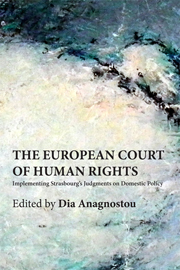Book contents
- Frontmatter
- Contents
- The contributors
- Acknowledgements
- Introduction: Untangling the domestic implementation of the European Court of Human Rights' judgments
- Part I INSTITUTIONAL DYNAMICS OF DOMESTIC IMPLEMENTATION
- Part II LEGAL MOBILISATION AND THE POLITICAL CONTEXT OF IMPLEMENTATION
- 4 European human rights case law and the rights of homosexuals, foreigners and immigrants in Austria
- 5 Political opposition and judicial resistance to Strasbourg case law regarding minorities in Bulgaria
- 6 Under what conditions do national authorities implement the European Court of Human Rights' rulings? Religious and ethnic minorities in Greece
- 7 A complicated affair: Turkey's Kurds and the European Court of Human Rights
- 8 The European Court of Human Rights and minorities in the United Kingdom: catalyst for change or hollow rhetoric?
- 9 Politics, courts and society in the national implementation and practice of European Court of Human Rights case law
- List of European Court of Human Rights judgments and European Commission on Human Rights cases
- Index
7 - A complicated affair: Turkey's Kurds and the European Court of Human Rights
from Part II - LEGAL MOBILISATION AND THE POLITICAL CONTEXT OF IMPLEMENTATION
Published online by Cambridge University Press: 05 April 2014
- Frontmatter
- Contents
- The contributors
- Acknowledgements
- Introduction: Untangling the domestic implementation of the European Court of Human Rights' judgments
- Part I INSTITUTIONAL DYNAMICS OF DOMESTIC IMPLEMENTATION
- Part II LEGAL MOBILISATION AND THE POLITICAL CONTEXT OF IMPLEMENTATION
- 4 European human rights case law and the rights of homosexuals, foreigners and immigrants in Austria
- 5 Political opposition and judicial resistance to Strasbourg case law regarding minorities in Bulgaria
- 6 Under what conditions do national authorities implement the European Court of Human Rights' rulings? Religious and ethnic minorities in Greece
- 7 A complicated affair: Turkey's Kurds and the European Court of Human Rights
- 8 The European Court of Human Rights and minorities in the United Kingdom: catalyst for change or hollow rhetoric?
- 9 Politics, courts and society in the national implementation and practice of European Court of Human Rights case law
- List of European Court of Human Rights judgments and European Commission on Human Rights cases
- Index
Summary
INTRODUCTION
The conflict between the Kurdish movement and the state remains the deepest faultline in Turkish politics. Obsessed with the preservation of national unity and homogeneity, the Turkish state has had little tolerance for Kurdish demands for greater legal recognition and a measure of autonomy. In a strategic move in its application for membership to what was then the European Community, Turkey decided in 1987 to give its citizens the right to petition the European Court of Human Rights (ECtHR/ the Court/Strasbourg). It was subsequently faced with the Kurds' effective use of this mechanism to raise international awareness to their plight. Since the early 1990s, the Kurdish question has been the greatest source of problems for Turkey before the ECtHR, and the cases taken to the Court by Turkey's Kurds provide a repository of information on the nature of the conflict.
Kurdish uprisings against the state's forced assimilation policies have led to repeated and often violent confrontations since the early years of the Republic. The most recent uprising has lasted the longest. The Kurdistan Workers' Party (PKK), founded in the late 1970s and strengthened in reaction to the oppression of the military regime of 1980–3, launched its first serious offensive against the Turkish army in 1984, starting an endless cycle of mutual violence. A state of emergency regime was declared in 1987, in eastern and south-eastern Turkey, that is, the Kurdish-populated territory where the armed conflict was taking place.
- Type
- Chapter
- Information
- The European Court of Human RightsImplementing Strasbourg's Judgments on Domestic Policy, pp. 166 - 187Publisher: Edinburgh University PressPrint publication year: 2013



